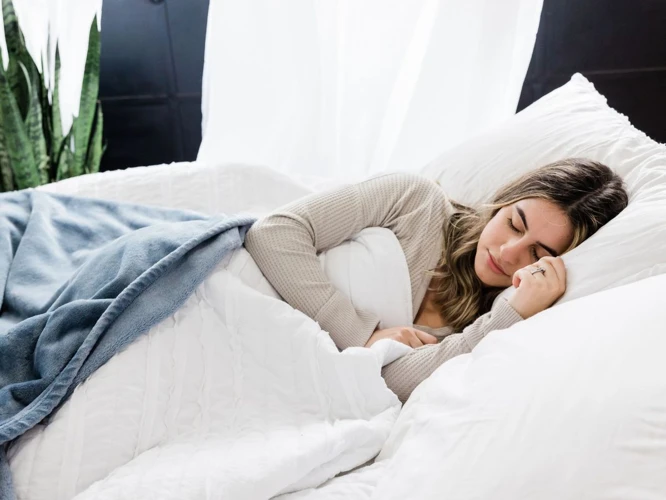Introduction

Getting a good night’s sleep is essential to our mental and physical well-being, and comfortable bedding plays a critical role in achieving this. Sleep hygiene, which refers to healthy sleep habits and environment, is vital in promoting quality sleep. Despite its importance, many people overlook the relevance of their bedding in sleep hygiene. In this article, we will explore the connection between bedding and sleep quality and the benefits of investing in high-quality bedding. We will also discuss essential factors one needs to consider when choosing bedding and how to care for it to ensure its longevity. By the end of this article, you’ll have a better understanding of why comfortable bedding is an essential component of sleep hygiene.
The Importance of Sleep Hygiene
Having proper sleep hygiene is crucial for maintaining overall health and well-being. This includes establishing a regular sleep schedule, creating a sleep-conducive environment, and using comfortable bedding.
Some of the key reasons why sleep hygiene matters include:
- Improved cognitive function: Getting enough quality sleep can help with memory and concentration.
- Enhanced physical health: Sleep is important for repairing the body and keeping the immune system strong.
- Better mental health: Poor sleep can contribute to anxiety and depression, while good sleep habits can improve mood.
- Increase safety: Lack of sleep can lead to accidents and injuries, both at home and in the workplace.
- Boosted productivity: When well-rested, people are typically more alert and efficient, leading to improved productivity at work and daily activities.
It’s clear that getting enough quality sleep is important for many aspects of life. As a result, taking steps to improve sleep hygiene can lead to numerous benefits. One way to improve sleep hygiene is by investing in comfortable bedding that promotes better sleep.
The Link Between Bedding and Sleep Quality

Getting a good night’s sleep is essential for our overall health and well-being. However, did you know that the bedding you sleep on plays a crucial role in determining the quality of your sleep? Yes, the type and quality of bedding can make all the difference in the world when it comes to getting a sweet slumber. It is vital to understand the link between bedding and sleep quality so that you can invest in the right kind of bedding that is comfortable and promotes better sleep. Let’s delve deeper into this relationship and understand how it works.
Bedding Types and Quality
When it comes to comfortable bedding, choosing the right type and quality is crucial. The following table highlights some of the most common bedding types and their corresponding qualities:
| Bedding Type | Quality |
|---|---|
| Cotton | Hypoallergenic, soft, durable, breathable, moisture-wicking |
| Silk | Smooth, luxurious, hypoallergenic, regulates temperature, gentle on skin |
| Satin | Soft, silky, smooth, luxurious, gentle on skin, may cause skin irritation for some |
| Flannel | Warm, cozy, soft, durable, may pill over time |
| Bamboo | Soft, breathable, hypoallergenic, moisture-wicking, eco-friendly |
Cotton is one of the most popular bedding types, as it is both comfortable and durable. It is also hypoallergenic, making it a great choice for those with allergies or sensitive skin. Silk, on the other hand, is known for its luxurious feel and temperature-regulating properties. It is also hypoallergenic and gentle on the skin. Satin is another option for those looking for a soft and silky feel, but it may cause skin irritation for some individuals.
Flannel is a good choice for colder climates, as it is warm and cozy. However, it may pill over time and lose its softness. Bamboo is a newer option that is becoming more popular due to its eco-friendliness and hypoallergenic properties. It is also soft and breathable, making it a comfortable choice for sleep. The quality of the bedding is just as important as the type of material used. Investing in high-quality bedding will ensure a comfortable and restful sleep experience.
The Science of Sleep Comfort
Achieving quality sleep involves more than just sleeping for the recommended 7-9 hours. Sleep comfort is a crucial factor that affects sleep quality. It is the science of sleep comfort that determines the quality of your bedding and how it impacts your sleep hygiene. Let’s take a closer look at the science behind sleep comfort.
The science of sleep comfort involves the study of various factors that affect sleep quality, such as the softness, firmness, and temperature regulation of bedding materials. These factors directly influence how comfortable you feel while sleeping, which translates to how well-rested you feel upon waking up.
One of the key factors that determine sleep comfort is the thread count of the bedding material. Thread count refers to the number of threads woven into one square inch of fabric. Bedding with a high thread count is typically softer, more durable, and more breathable, which makes it more comfortable to sleep on.
Additionally, the type of material used to make the bedding also affects sleep comfort. High-quality materials like cotton, bamboo, or linen have natural moisture-wicking properties that help regulate body temperature and keep you cool and comfortable throughout the night.
Another scientific aspect of sleep comfort is the concept of pressure points. When you sleep, certain areas of your body, like the hips and shoulders, tend to bear more weight and pressure than others. The proper bedding with firmness and support can help distribute your weight evenly, prevent pressure points, and promote better circulation.
Lastly, the science of sleep comfort considers the importance of proper sizing and fit of bedding. Uncomfortable sheets that are ill-fitting can cause discomfort and restless nights, leading to groggy, unrested mornings. Investing in properly-sized bedding ensures that you get a comfortable and restful sleep, allowing you to wake up feeling rejuvenated and energized.
Ensuring that you have high-quality bedding that conforms to the science of sleep comfort can make a significant difference in how well you sleep. With a better understanding of the science behind sleep comfort, you can make informed decisions when choosing your bedding materials, sizes, and textures to ensure that you get the restful sleep that you need to lead a healthy and productive life.
| Factors That Affect Sleep Comfort |
|---|
| Thread count |
| Material |
| Pressure points |
| Sizing and fit |
Benefits of Investing in High-Quality Bedding

Quality bedding serves more than just an aesthetic purpose. It plays an essential role in maintaining good sleep hygiene. Investing in high-quality bedding can have many benefits for your overall health and wellbeing. Here are some compelling reasons why you should consider upgrading your bedding.
Better Sleep Quality
Investing in high-quality bedding can significantly improve the quality of sleep an individual gets each night. Here’s a list of some benefits that come with better sleep quality:
- Improved Comfort: High-quality bedding can offer better comfort and support, resulting in less discomfort and less restlessness; this makes it easier to fall asleep and stay asleep throughout the night.
- Reduced Pain: Sleeping on old, inadequate bedding can lead to aches and pains in the joints and muscles. In contrast, the proper bedding can alleviate pain and stiffness, leaving one feeling more refreshed upon waking.
- Reduced Stress: When people sleep on uncomfortable beds, they may have trouble falling asleep, which can cause frustration and anxiety. Investing in high-quality bedding can help reduce stress levels and improve relaxation, leading to better sleep quality.
- Better Sleep Routines: A comfortable bed can help in developing a bedtime routine that results in better sleep quality. Using that bed for rest or relaxation consistently can train the mind to associate the bed with sleep.
- Improved Mental Health: A night of restful sleep is essential to ensuring better mental health. It is essential in improving an individual’s mental health reduces the risk of mood swings, anxiety, and depression.
Improving sleep quality can lead to increased energy levels during the day, and overall better mood and productivity.
Improved Overall Health
Investing in high-quality bedding not only leads to better sleep quality, but can also have significant positive impacts on overall health. Here are some ways that comfortable bedding can contribute to improved health:
- Relief from Pain and Discomfort: Quality bedding can provide the necessary support and cushioning to alleviate aches and pains. For example, a mattress that is too firm or too soft can lead to back pain and poor spinal alignment, while a comfortable pillow can help prevent neck pain.
- Allergy Prevention: Dust mites and other allergens can accumulate in older bedding, leading to respiratory issues and skin irritation. High-quality bedding is often hypoallergenic and can provide a barrier against allergens, promoting better respiratory health.
- Decreased Anxiety and Stress: A comfortable and supportive sleep environment can help to reduce anxiety and stress levels, leading to better overall mental health. Soft and cozy bedding can create a sense of calm and comfort, helping you fall asleep more easily and wake up feeling refreshed.
- Stronger Immune System: Quality bedding can also contribute to a stronger immune system. Investing in bedding made from natural fibers, such as cotton or bamboo, can help regulate body temperature and reduce the risk of bacterial and fungal infections.
The impact of comfortable bedding on overall health cannot be overstated. Whether it’s through pain relief, allergy prevention, stress reduction, or immune system support, investing in high-quality bedding is an investment in your health and well-being.
Enhanced Mood and Productivity
Investing in high-quality bedding can have a significant impact on not just the quantity, but also the quality of your sleep. When you sleep well, you wake up feeling refreshed, energized and ready to take on the day. This, in turn, can lead to improved mood and productivity throughout the day.
Here are some ways in which comfortable bedding can enhance your mood and productivity:
- Reduced Stress: A comfortable bed helps you relax, reducing your stress levels and promoting mental well-being. This can help you stay focused and prevent anxiety and depression.
- Better Sleep: Comfortable bedding can help you sleep better, reducing the likelihood of experiencing fatigue, irritability and low mood throughout the day.
- Increased Energy: Spending the night in a comfortable bed can leave you feeling energized and recharged, making it easier to get things done throughout the day.
- Enhanced Creativity: Good quality sleep can help boost creativity, providing you with the mental clarity and focus you need to come up with innovative ideas or solve complex problems.
- Improved Memory and Learning: Good sleep habits are linked to improved cognitive abilities, including memory and learning. So investing in comfortable bedding can help boost your academic or professional performance.
If you struggle with sleeplessness or find yourself frequently feeling tired and lethargic, making a change to your bedding could be the solution you need to boost your mood and productivity. So, consider the factors mentioned above when choosing your bedding and try to make good sleep hygiene a priority.
Factors to Consider when Choosing Bedding

When it comes to selecting the perfect bedding options for a good night’s sleep, several crucial factors deserve careful consideration. From the material and texture to firmness, support, and temperature regulation, finding the right bedding to meet individual needs can be perplexing. However, taking the time to research and weigh up various aspects can pay off in the form of a better, more comfortable, and refreshing sleep. So, what should one keep in mind when looking for high-quality bedding that enhances sleep hygiene? Let’s delve into the key factors to consider.
Material and Texture
When choosing bedding, material and texture are important factors to consider. The right combination can make all the difference between a restful night’s sleep and a restless one. Here are some materials to consider when choosing comfortable bedding:
| Material | Texture | Benefits |
|---|---|---|
| Cotton | Soft, breathable, and hypoallergenic. | It’s also easy to clean and has a long lifespan. |
| Silk | Smooth and luxurious with natural cooling properties. | Highly absorbent and great for people with dry skin or allergies. |
| Linen | Durable and lightweight with a natural texture. | Known for its ability to keep you cool in warm weather. |
| Microfiber | Soft and lightweight with a smooth texture. | Durable and wrinkle-resistant, it’s a great option for those with sensitive skin or allergies. |
It’s important to note that different textures within the same material can have a big impact on comfort. For example, cotton percale has a crisp texture while cotton sateen has a silky smooth one. It really comes down to personal preference and what feels best for your sleeping habits.
In addition to material and texture, consider the thread count, which refers to the number of horizontal and vertical threads per square inch of fabric. A higher thread count does not always mean better quality or comfort, but it can indicate a more durable and softer fabric.
Taking the time to research and choose the right material and texture for your bedding can greatly improve your sleep quality and overall comfort.
Firmness and Support
When choosing bedding, it is important to take into account the level of firmness and support that it provides. A too-soft mattress or pillow can cause strain and discomfort, leading to poor sleep quality.
Factors to consider when evaluating firmness:
- Sleeping Position: Each sleeping position requires a different level of firmness. Back sleepers typically require a firmer mattress than side sleepers to ensure proper spinal alignment. Stomach sleepers need a firm mattress to prevent sinkage and pressure on the neck.
- Material: Some materials, such as memory foam, tend to be more supportive than others. However, this can vary depending on the specific type and quality of the material.
- Personal Preferences: Ultimately, the firmness level that is ideal for one person may not be suitable for another. It is important to take into account personal preferences and any preexisting medical conditions when selecting bedding.
In addition to firmness, support is also crucial for a comfortable and restful sleep. Support refers to the degree to which the bedding provides even weight distribution and pressure-point relief.
Factors to consider when evaluating support:
- Alignment: Proper spinal alignment is critical for support. The mattress or pillow should contour to the body, keeping the spine in a neutral position.
- Pressure Points: Support should also alleviate pressure points, ensuring that there is no undue stress on any particular area of the body. This can be especially important for those with various health conditions, such as arthritis or fibromyalgia.
- Size: It is also important to choose bedding that fits properly. An ill-fitting mattress or pillow can compromise the level of support provided and thus interfere with sleep quality.
By taking into account both firmness and support, one can select bedding that provides a comfortable and restful night’s sleep. It is important to consider individual needs and preferences as well as any health concerns when making choices about bedding.
Temperature Regulation
When it comes to temperature regulation, it’s important to choose bedding that will keep you comfortable throughout the night. Here are some factors to consider:
- Fabric: Look for fabrics that are breathable, moisture-wicking, and able to regulate body temperature. Natural fibers like cotton and linen are good choices.
- Thread Count: A high thread count doesn’t necessarily equate to better temperature regulation. In fact, a higher thread count can make bedding less breathable. Look for a thread count between 200-400.
- Weave: Percale and sateen weaves are the most common. Percale is a plain weave that is crisp and breathable, while sateen is a satin weave that is smooth and may retain heat. Choose the weave that feels best to you.
- Fill: If you’re using a comforter or duvet, consider the fill material. Down is known for its warmth, but some people may find it too hot. Down alternatives like polyester or wool can provide warmth without as much heat retention.
By choosing bedding that helps regulate temperature, you can avoid waking up in the middle of the night feeling too hot or too cold. This can improve overall sleep quality and leave you feeling more rested in the morning.
Caring for Bedding
Taking care of your bedding properly is crucial to maintaining its quality and durability. Not only does it ensure that your bedding continues to look and feel great night after night, but it also helps to prevent the growth of bacteria and allergens that can negatively impact your sleep hygiene. In this section, we will explore some essential tips for caring for your bedding effectively so that you can enjoy a hygienic sleep environment and prolong the life of your bedding.
Washing and Drying Instructions
Proper washing and drying of bedding are essential for maintaining its quality and extending its lifespan. Here are some important instructions to keep in mind when washing and drying your bedding:
| Step | Instructions |
|---|---|
| Step 1: | Read the Care Label: Always check the care label on your bedding before washing it. The care label will provide you with specific instructions on how to wash and dry the material properly. |
| Step 2: | Sort Your Laundry: To avoid damage or color bleeding, separate your bedding from other clothes and sort them based on color and material. Similar colors should be washed together, and delicate fabrics should be washed separately. |
| Step 3: | Use the Right Detergent: Be mindful of using the correct detergent. Some detergents are too harsh for certain materials and can cause damage or fading. |
| Step 4: | Wash in Cold Water: Hot water can cause shrinkage and damage to the bedding material, so it’s best to wash bedding in cold water. Cold water also helps to maintain the color and quality of the bedding. |
| Step 5: | Use Gentle Cycle: Use a gentle cycle to avoid damage to the material. A normal or heavy-duty cycle can cause wear and tear on the bedding. |
| Step 6: | Avoid Fabric Softeners: While they may seem like a good idea, fabric softeners can actually leave a layer of residue on the bedding material that can cause irritation to sensitive skin. |
| Step 7: | Dry on Low Heat: High heat can cause shrinkage and damage to the material. Instead, opt for a low heat setting, or use an air-dry setting. |
| Step 8: | Remove from Dryer Promptly: Promptly remove the bedding from the dryer to avoid wrinkling. If wrinkles do occur, you can iron the bedding on a low setting. |
Following these washing and drying instructions will help you keep your bedding in excellent condition for a long time. Proper care and maintenance of your bedding will also help you get the most out of your investment, ensuring that you enjoy a comfortable and restful night’s sleep.
Pillows and Mattress Maintenance
Maintaining your pillows and mattress is crucial for ensuring they last a long time and continue to provide optimal comfort and support for a good night’s sleep. Here are some tips on how to properly care for your pillows and mattress:
- Regular Cleaning: Pillows should be washed every six months, while mattresses should be vacuumed every few months. This will help remove dust, allergens and bacteria that can accumulate over time.
- Fluffing: Fluff your pillows regularly to prevent them from becoming flat and losing their shape. Mattresses can also benefit from occasional flipping and rotating to distribute the weight evenly.
- Protection: It’s a good idea to invest in protective covers for both your pillows and mattress. These covers will help prevent the build-up of dirt and liquids that can cause damage or unpleasant odours.
- Replacement: Pillows should be replaced every two years, while mattresses should be replaced every seven to ten years. Over time, the materials can break down and lose their supportive qualities, which can negatively impact your sleep quality.
By following these simple steps, you can ensure the longevity and quality of your pillows and mattress, leading to a better sleep experience overall.
Conclusion
After analyzing the various aspects of sleep hygiene and the role of comfortable bedding in ensuring optimal sleep, it is evident that investing in high-quality bedding is crucial for improving both the quantity and quality of sleep.
Not only does comfortable bedding contribute to better sleep quality, but it also offers a range of benefits such as improved health, enhanced mood, and increased productivity. By providing the necessary support and cushioning, high-quality bedding can alleviate pain, reduce stress, and enhance relaxation, leading to a deeper and more restorative sleep.
When choosing bedding, it is important to consider factors such as material and texture, firmness and support, and temperature regulation. Opting for natural materials such as cotton, silk, or bamboo can ensure maximum breathability and minimize irritation, while choosing a mattress and pillows that suit your sleeping style and preferences can provide the necessary support and cushioning for your body.
In addition to selecting the right bedding, it is equally important to care for it properly by washing and drying it according to the instructions, and regularly maintaining the mattress and pillows to prevent wear and tear.
In conclusion, the value of comfortable bedding in enhancing sleep quality and overall health cannot be overstated. By prioritizing high-quality bedding that is tailored to your needs, and ensuring proper maintenance, you can significantly improve your sleep hygiene and enjoy the many benefits that come with a good night’s rest.
Frequently Asked Questions
Q: What is sleep hygiene?
Sleep hygiene refers to the habits and practices that promote good quality sleep. It includes factors such as the sleep environment, bedtime routine, and daily habits that can affect sleep.
Q: How does bedding affect sleep quality?
The quality of bedding can greatly impact sleep quality. The correct bedding can provide the necessary support, comfort and temperature regulation to help you sleep comfortably throughout the night.
Q: Does the material of bedding affect sleep quality?
Yes, the material of the bedding can affect sleep quality. Breathable materials such as cotton and linen can help regulate temperature, while synthetic materials can cause discomfort and overheat the body.
Q: Can investing in high-quality bedding improve overall health?
Yes, investing in high-quality bedding can improve overall health. By improving sleep quality, it can lead to better physical and mental health, including improved immune function, memory, and mood.
Q: How do pillows affect sleep quality?
Pillows can either provide support for the head, neck and shoulders, or cause discomfort and strain. The correct pillow choice can greatly impact the quality of sleep and alleviate pain in the body.
Q: What is the optimal temperature for sleep?
The optimal temperature for sleep is between 65-72°F (18-22°C), as it allows the body to cool down and fall into a deep sleep without overheating.
Q: Does thread count impact bedding quality?
Thread count measures the number of threads woven into one square inch of fabric. While higher thread count can mean softer and smoother bedding, it does not necessarily mean better quality. Other factors such as material, weave and finish also contribute to the quality of bedding.
Q: How often should bedding be washed?
Bedding should be washed every 1-2 weeks to maintain cleanliness and prevent the accumulation of dirt, sweat, and dust mites.
Q: Can the quality of a mattress affect sleep quality?
Yes, the quality of a mattress plays a significant role in sleep quality. The correct level of firmness, material and support can alleviate pain, improve circulation and provide comfort necessary for good sleep.
Q: Is it important to maintain bedding regularly?
Yes, it is important to maintain bedding regularly to prolong its lifespan and ensure it remains hygienic for sleep. Regular washing, drying and maintenance of pillows and mattresses can help prevent dust mites, allergens and damage.








